
ABOUT SPEAKERS PROGRAM POSTER SUBMISSIONS VENUE
Ab Ak Ba Be Bi Ca Ce Ch Fra Fre Ga Ge Gh J Ka Ku M N O S Th To We Wo
Norman Abramson
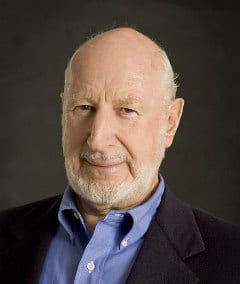 Norman Abramson received an A.B. in physics from Harvard College in 1953, an M.A. in physics from UCLA in 1955, and a Ph.D. in Electrical Engineering from Stanford in 1958.
Norman Abramson received an A.B. in physics from Harvard College in 1953, an M.A. in physics from UCLA in 1955, and a Ph.D. in Electrical Engineering from Stanford in 1958.
He was an assistant professor and associate professor of electrical engineering at Stanford from 1958 to 1965. From 1967 to 1995 he was Professor of Electrical Engineering, Professor of Information and Computer Science, Chairman of the Department of Information and Computer Science, and Director of the ALOHA System at the University of Hawaii in Honolulu. He is now Professor Emeritus of Electrical Engineering at the University of Hawaii. He has held visiting appointments at Berkeley (1965), Harvard (1966) and MIT (1980).
Abramson is the recipient of several major awards for his work on random access channels and the ALOHA Network, the first wireless data network. The ALOHA Network went into operation in Hawaii in June, 1971. Among these awards are the Eduard Rhein Foundation Technology Award (Munich, 2000), the IEEE Alexander Graham Bell Medal (Philadelphia, 2007) and the NEC C&C Foundation Award (Tokyo, 2011).
Ian Akyildiz, Georgia Tech
 Ian F. Akyildiz is currently the Ken Byers Chair Professor in Telecommunications with the School of Electrical and Computer Engineering, Director of the Broadband Wireless Networking Laboratory, and Chair of the Telecommunication Group at Georgia Institute of Technology, Atlanta, USA. Since 2017, he is a Consulting Chair Professor at the University of Cyprus. He is a Megagrant Research Leader with the Institute for Information Transmission Problems at the Russian Academy of Sciences, in Moscow, Russia, since May 2018.
Ian F. Akyildiz is currently the Ken Byers Chair Professor in Telecommunications with the School of Electrical and Computer Engineering, Director of the Broadband Wireless Networking Laboratory, and Chair of the Telecommunication Group at Georgia Institute of Technology, Atlanta, USA. Since 2017, he is a Consulting Chair Professor at the University of Cyprus. He is a Megagrant Research Leader with the Institute for Information Transmission Problems at the Russian Academy of Sciences, in Moscow, Russia, since May 2018.
His current research interests are in 5G/6G wireless systems, CubeSat networks, intelligent environments, Terahertz band communications, molecular communications, and wireless sensor networks in challenged environments. He is an IEEE Fellow (1996) and an ACM Fellow (1997). He has received
numerous awards from the IEEE and the ACM, and many other organizations. He published many medium access control protocols for wireless multimedia networks as parts of 3G/4G/5G, wireless sensor networks, underwater and underground communication networks, wireless mesh networks and satellite networks where he used the ALOHA protocol as one of the basic building blocks in his protocols. His h-index is 119, and the total number of citations is above 112K as per Google scholar as of December 2019.
Stefano Basagni, Northeastern University
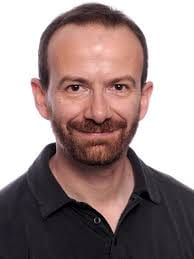 Stefano Basagni holds a Ph.D. in electrical engineering from the University of Texas at Dallas (December 2001) and a Ph.D. in computer science from the University of Milano, Italy (May 1998). He received his B.Sc. degree in computer science from the University of Pisa, Italy, in 1991. He is currently an associate professor at the Department of Electrical and Computer Engineering at Northeastern University, in Boston, MA. He is also affiliated with Northeastern’s Institute for the Wireless Internet of Things.
Stefano Basagni holds a Ph.D. in electrical engineering from the University of Texas at Dallas (December 2001) and a Ph.D. in computer science from the University of Milano, Italy (May 1998). He received his B.Sc. degree in computer science from the University of Pisa, Italy, in 1991. He is currently an associate professor at the Department of Electrical and Computer Engineering at Northeastern University, in Boston, MA. He is also affiliated with Northeastern’s Institute for the Wireless Internet of Things.
Dr. Basagni’s current research interests concern research and implementation aspects of mobile networks and wireless communications systems, wireless sensor networking for IoT (underwater and terrestrial), definition and performance evaluation of network protocols and theoretical and practical aspects of distributed algorithms.
Dr. Basagni has published over seven dozen of highly cited, refereed technical papers and book chapters. His h-index is currently 44. He is also co-editor of three books. Dr. Basagni served as a guest editor of multiple international ACM/IEEE, Wiley and Elsevier journals. He has been the TPC co-chair of international conferences such as ACM Dial M for Mobility (2004), Med Hoc Net (2006), IEEE SECON (2010), IEEE Globecom (AHSN Symposium, 2012), IEEE MASS (2012), IEEE WiMob 2013, IEEE ICNC (NAPE Symposium, 2015), IFIP Wireless Days 2016, ACM WUWNet (2017), IEEE ICNC (WAHS Symposium, 2018), Med Hoc Net (2018), and IEEE ICNC (NAPE Symposium, 2019). He was the general co-chair of IEEE SECON 2019.
Dr. Basagni serves as a member of the editorial board, the organizing committee and of the technical program committee of ACM and IEEE journals and international conferences. He is a distinguished scientist of the ACM (including the ACM SIGMOBILE), a senior member of the IEEE (Computer and Communications societies), a member of ASEE (American Society for Engineering Education) and of CUR (Council for Undergraduate Education).
Elizabeth Belding, University of California, Santa Barbara
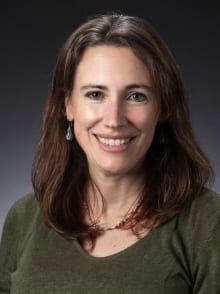 Elizabeth M. Belding is a Professor in the Department of Computer Science at the University of California, Santa Barbara. Prof. Belding’s research focuses on mobile and wireless networking, including network performance analysis, and information and communication technologies for development (ICTD). She is a co-developer of the AODV routing protocol for mobile networks, on which 802.11s and Zigbee technologies are based in part. The original AODV paper published in WMCSA’99 received the 2018 ACM SIGMOBILE Test of Time Award. Prof. Belding applies her wireless network expertise to a wide range of contexts, and is particularly interested in improving Internet and cellular accessibility in developing and resource-challenged communities worldwide. Her ICTD projects have included work in Zambia, South Africa, Mongolia, and refugee camps. Most recently, she has been working with Native American communities around the US. She is the founder and director of the Mobility Management and Networking (MOMENT) Laboratory. Prof. Belding is the author of over 150 technical papers on wireless networking and has served on over 80 conference technical program committees. She was Vice Chair of the UCSB Computer Science department 2009-15 and 2017-19. She is currently an Associate Dean and Faculty Equity Advisor in the UCSB College of Engineering. Prof. Belding is the recipient of an NSF CAREER Award, and a 2002 MIT Technology Review 100 award, awarded to the world’s top young investigators. She is an ACM Fellow, AAAS Fellow and IEEE Fellow. She is particularly proud of receiving the UCSB Outstanding Graduate Mentor Award in 2012 and the NCWIT Harrold and Notkin Research and Graduate Mentoring Award in 2015 for her mentorship of graduate students.
Elizabeth M. Belding is a Professor in the Department of Computer Science at the University of California, Santa Barbara. Prof. Belding’s research focuses on mobile and wireless networking, including network performance analysis, and information and communication technologies for development (ICTD). She is a co-developer of the AODV routing protocol for mobile networks, on which 802.11s and Zigbee technologies are based in part. The original AODV paper published in WMCSA’99 received the 2018 ACM SIGMOBILE Test of Time Award. Prof. Belding applies her wireless network expertise to a wide range of contexts, and is particularly interested in improving Internet and cellular accessibility in developing and resource-challenged communities worldwide. Her ICTD projects have included work in Zambia, South Africa, Mongolia, and refugee camps. Most recently, she has been working with Native American communities around the US. She is the founder and director of the Mobility Management and Networking (MOMENT) Laboratory. Prof. Belding is the author of over 150 technical papers on wireless networking and has served on over 80 conference technical program committees. She was Vice Chair of the UCSB Computer Science department 2009-15 and 2017-19. She is currently an Associate Dean and Faculty Equity Advisor in the UCSB College of Engineering. Prof. Belding is the recipient of an NSF CAREER Award, and a 2002 MIT Technology Review 100 award, awarded to the world’s top young investigators. She is an ACM Fellow, AAAS Fellow and IEEE Fellow. She is particularly proud of receiving the UCSB Outstanding Graduate Mentor Award in 2012 and the NCWIT Harrold and Notkin Research and Graduate Mentoring Award in 2015 for her mentorship of graduate students.
Richard Binder
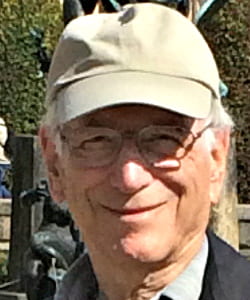 Richard Binder received a BS in Physics from UCLA in 1961 and an MS in Information Sciences from the University of Hawaii in 1970. He was one of the original developers of the ALOHA network at the University of Hawaii beginning in 1969, focused on detailed ALOHA protocol design and central controller software. As part of the ALOHA project he also worked on the development of random access reservation techniques for broadcast satellites, and continued this work at Bolt Beranek and Newman for the Atlantic packet satellite network. Later at Linkabit Corporation he led an ARPA-sponsored multi-contractor effort to design a low-altitude multiple satellite system using random access techniques, and subsequently joined the Corporation for National Research Initiatives where he helped coordinate the Gigabit Testbed Initiative (which involved no random access channels at all). He is now retired, randomly generating paintings.
Richard Binder received a BS in Physics from UCLA in 1961 and an MS in Information Sciences from the University of Hawaii in 1970. He was one of the original developers of the ALOHA network at the University of Hawaii beginning in 1969, focused on detailed ALOHA protocol design and central controller software. As part of the ALOHA project he also worked on the development of random access reservation techniques for broadcast satellites, and continued this work at Bolt Beranek and Newman for the Atlantic packet satellite network. Later at Linkabit Corporation he led an ARPA-sponsored multi-contractor effort to design a low-altitude multiple satellite system using random access techniques, and subsequently joined the Corporation for National Research Initiatives where he helped coordinate the Gigabit Testbed Initiative (which involved no random access channels at all). He is now retired, randomly generating paintings.
Marcelo Carvalho, University of Brasilia
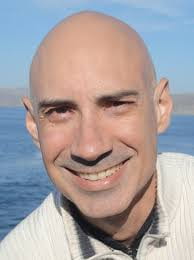 Marcelo M. Carvalho received his Ph.D. degree in Computer Engineering from the University of California Santa Cruz (UCSC) (2006), his M.Sc. degree in Electrical and Computer Engineering from both the University of California Santa Barbara (UCSB) (2003) and the State University of Campinas (Unicamp) (1998), and his B.Sc. degree in Electrical Engineering from the Federal University of Pernambuco (UFPE) (1995). Currently, he is a Professor Adjunto (Assistant Professor) in the Department of Electrical Engineering at the University of Brasília (UnB), where he is a member of the Graduate Program on Electronics and Automation Systems Engineering (PGEA) and the Graduate Program on Electrical Engineering (PPGEE). Dr. Carvalho was a Visiting Research Scholar in the Erik Jonsson School of Engineering and Computer Science at the University of Texas at Dallas (2018-2019) and at CONNECT, Trinity College Dublin (2012). He is the co-recipient of the Best Paper Award at IFIP/IEEE Wireless Days 2018, the Strategy Award at MANIAC Challenge 2013, and runner-up for Best Paper Award at ICCCN 2004. He is the Area Co-Chair of Hot Topics in Networking of ICCCN 2020, Program Co-Chair of IEEE MASS 2019, and has served as General Co-Chair of IEEE MASS 2016, IEEE CARTOON 2014, and in the technical program committee of many IEEE/ACM conferences. He is an active reviewer to many journals, being recognized as an Exemplary Reviewer of IEEE Communications Letters (2010). His research interests are in the fields of wireless networking, mobile networking, Internet of Things, and multimedia communications. He is a member of the IEEE and ACM societies.
Marcelo M. Carvalho received his Ph.D. degree in Computer Engineering from the University of California Santa Cruz (UCSC) (2006), his M.Sc. degree in Electrical and Computer Engineering from both the University of California Santa Barbara (UCSB) (2003) and the State University of Campinas (Unicamp) (1998), and his B.Sc. degree in Electrical Engineering from the Federal University of Pernambuco (UFPE) (1995). Currently, he is a Professor Adjunto (Assistant Professor) in the Department of Electrical Engineering at the University of Brasília (UnB), where he is a member of the Graduate Program on Electronics and Automation Systems Engineering (PGEA) and the Graduate Program on Electrical Engineering (PPGEE). Dr. Carvalho was a Visiting Research Scholar in the Erik Jonsson School of Engineering and Computer Science at the University of Texas at Dallas (2018-2019) and at CONNECT, Trinity College Dublin (2012). He is the co-recipient of the Best Paper Award at IFIP/IEEE Wireless Days 2018, the Strategy Award at MANIAC Challenge 2013, and runner-up for Best Paper Award at ICCCN 2004. He is the Area Co-Chair of Hot Topics in Networking of ICCCN 2020, Program Co-Chair of IEEE MASS 2019, and has served as General Co-Chair of IEEE MASS 2016, IEEE CARTOON 2014, and in the technical program committee of many IEEE/ACM conferences. He is an active reviewer to many journals, being recognized as an Exemplary Reviewer of IEEE Communications Letters (2010). His research interests are in the fields of wireless networking, mobile networking, Internet of Things, and multimedia communications. He is a member of the IEEE and ACM societies.
Vint Cerf, Google
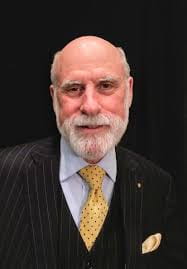 Vinton G. Cerf is vice president and Chief Internet Evangelist for Google. He contributes to global policy development and continued spread of the Internet. Widely known as one of the “Fathers of the Internet,” Cerf is the co-designer of the TCP/IP protocols and the architecture of the Internet. He has served in executive positions at MCI, the Corporation for National Research Initiatives and the Defense Advanced Research Projects Agency and on the faculty of Stanford University.
Vinton G. Cerf is vice president and Chief Internet Evangelist for Google. He contributes to global policy development and continued spread of the Internet. Widely known as one of the “Fathers of the Internet,” Cerf is the co-designer of the TCP/IP protocols and the architecture of the Internet. He has served in executive positions at MCI, the Corporation for National Research Initiatives and the Defense Advanced Research Projects Agency and on the faculty of Stanford University.
Vint Cerf served as chairman of the board of the Internet Corporation for Assigned Names and Numbers (ICANN) from 2000-2007 and has been a Visiting Scientist at the Jet Propulsion Laboratory since 1998. Cerf served as founding president of the Internet Society (ISOC) from 1992-1995. Cerf is a Foreign Member of the British Royal Society and Swedish Academy of Engineering, and Fellow of IEEE, ACM, and American Association for the Advancement of Science, the American Academy of Arts and Sciences, the International Engineering Consortium, the Computer History Museum, the British Computer Society, the Worshipful Company of Information Technologists, the Worshipful Company of Stationers and a member of the National Academy of Engineering. He currently serves as Past President of the Association for Computing Machinery, chairman of the American Registry for Internet Numbers (ARIN) and completed a term as Chairman of the Visiting Committee on Advanced Technology for the US National Institute of Standards and Technology. President Obama appointed him to the National Science Board in 2012.
Cerf is a recipient of numerous awards and commendations in connection with his work on the Internet, including the US Presidential Medal of Freedom, US National Medal of Technology, the Queen Elizabeth Prize for Engineering, the Prince of Asturias Award, the Tunisian National Medal of Science, the Japan Prize, the Charles Stark Draper award, the ACM Turing Award, Officer of the Legion d’Honneur and 29 honorary degrees. In December 1994, People magazine identified Cerf as one of that year’s “25 Most Intriguing People.”
Ram Chandran, AnaCom, Inc.
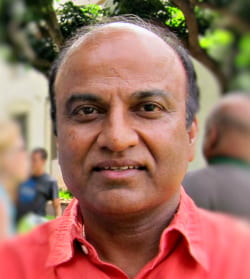 S. Ram Chandran is a Silicon Valley entrepreneur in wireless & satellite communications industry. Most recently, Dr. Chandran founded Kromos Communications Inc., a VC funded startup company for the design and manufacturing of IP networking solutions over satellites. At Kromos, he was instrumental in building a Satellite based Emergency Response Network for the State of California (the largest of its kind in the world) right from the proposal to implementation stage. Kromos Communications was acquired by AnaCom, Inc., a
S. Ram Chandran is a Silicon Valley entrepreneur in wireless & satellite communications industry. Most recently, Dr. Chandran founded Kromos Communications Inc., a VC funded startup company for the design and manufacturing of IP networking solutions over satellites. At Kromos, he was instrumental in building a Satellite based Emergency Response Network for the State of California (the largest of its kind in the world) right from the proposal to implementation stage. Kromos Communications was acquired by AnaCom, Inc., a
leader in Satellite Communications. Currently, he is Senior Vice President at AnaCom, Inc.
Dr. Chandran was a founding member & Director of Engineering at Aloha Networks, a company with a proprietary technology to enable satellite based internet access using low cost VSAT terminals. He was also involved in a couple of other startups in Bay Area. At TeleSciences Transmission Systems (later acquired by California Microwave), Dr. Chandran designed a 64-QAM 155 Mbps modem for Digital Microwave Radios (among the first of its kind in Industry). This was done using discrete components before the
advent of high-capacity modem chipsets from Broadcom, Intersil etc. He obtained his PhD in Electrical Engineering from University of Hawaii at
Manoa, Honolulu. He is a Senior Member of IEEE.
Luigi Fratta, Politecnico di Milano
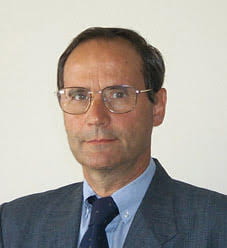 Luigi Fratta received the Doctorate in Electrical Engineering from the Politecnico di Milano, Milano, Italy, in 1966 and he is a Life Fellow of IEEE. He started his research activity at the Department of Computer Science, University of California, Los Angeles, participating in data network design under the ARPA project from 1970 to 1971. Since then, as a Professor at Politecnico di Milano, he has been active on several communication topics covering computer communication networks, packet switching networks, multiple access systems, modeling and performance evaluation of communication systems, local area networks, wireless cellular systems and integrated services over IP networks.
Luigi Fratta received the Doctorate in Electrical Engineering from the Politecnico di Milano, Milano, Italy, in 1966 and he is a Life Fellow of IEEE. He started his research activity at the Department of Computer Science, University of California, Los Angeles, participating in data network design under the ARPA project from 1970 to 1971. Since then, as a Professor at Politecnico di Milano, he has been active on several communication topics covering computer communication networks, packet switching networks, multiple access systems, modeling and performance evaluation of communication systems, local area networks, wireless cellular systems and integrated services over IP networks.
In 1979 he was a Visiting Associate Professor in the Department of Computer Science at the University of Hawaii – a good opportunity to cooperate with Norman Abramson and to get involved with ALOHA. The multiple access protocol research area inspired by ALOHA has been a relevant research topic developed at Advanced Network Technologies Lab, Politecnico di Milano, from 1979 to today.
After his time at the University of Hawaii, in the summer of 1981, he was at the Computer Science Department, IBM Research Center, San Jose, California, working on local area networks. During the summers of 1983, 1989, and 1992, he was with the Research in Distributed Processing Group, Department of Computer Science, UCLA, working on fiber optic local area networks. During the summer of 1986, he was with Bell Communication Research working on metropolitan area networks. In 1994, he was a visiting scientist at NEC Network Research Laboratory, Japan. Since 1980, he has been a full professor in the Dipartimento di Elettronica e Informazione at the Politecnico di Milano.
James Freebersyser, Director of Advanced Systems, Raytheon BBN
James Freebersyser is the Director of Advanced Systems at Raytheon BBN Technologies. Previously, Dr. Freebersyser was a program manager at the Defense Advanced Research Projects Agency (DARPA) Advanced Technology Office, Office of Naval Research (ONR), and Army Research Office (ARO). He received his B.S.E. in electrical engineering from Duke University, an M.S. in electrical engineering from the University of Virginia, and a Ph.D. in electrical engineering from North Carolina State University. Dr. Freebersyser is a Senior member of IEEE.
J.J. Garcia-Luna-Aceves, CITRIS Campus Director, UCSC
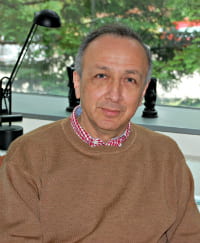 J.J. Garcia-Luna-Aceves is the Director of CITRIS and the Banatao Institute UC Santa Cruz. He received the B.S. degree in Electrical Engineering from the Universidad Iberoamericana, Mexico City, Mexico in 1977; and the M.S. and Ph.D. degrees in Electrical Engineering from the University of Hawaii at Manoa, Honolulu, HI in 1980 and 1983, respectively.
J.J. Garcia-Luna-Aceves is the Director of CITRIS and the Banatao Institute UC Santa Cruz. He received the B.S. degree in Electrical Engineering from the Universidad Iberoamericana, Mexico City, Mexico in 1977; and the M.S. and Ph.D. degrees in Electrical Engineering from the University of Hawaii at Manoa, Honolulu, HI in 1980 and 1983, respectively.
He is a Distinguished Professor of Computer Science and Engineering at the University of California, Santa Cruz (UCSC) and is a Principal Scientist at the Palo Alto Research Center (PARC). Prior to joining UCSC in 1993 he was a Center Director at SRI International (SRI) in Menlo Park, California. He has been a Visiting Professor at Sun Laboratories in Menlo Park, California, and a Principal of Protocol Design at Nokia in Mountain View, California.
Dr. Garcia-Luna-Aceves was elected a Corresponding Member of the Mexican Academy of Sciences in 2013; and is a fellow of the Institute of Electrical and Electronics Engineers (IEEE), the Association for Computing Machinery (ACM), and the American Association for the Advancement of Science (AAAS).
He received the 2016 IEEE MILCOM Technical Achievement Award for sustained contributions to military communications. He received the IEEE Computer Society Technical Achievement Award in 2011 “for pioneering contributions to the theory and design of communication protocols for ad-hoc wireless networks.” He received the IEEE Communications Society Ad Hoc and Sensor Networks Technical Committee (AHSN TC) Technical Recognition Award in 2012 “for fundamental contributions to the theory and design of communication protocols for routing and channel access in ad-hoc wireless networks.”
He is the co-recipient of the 2017 George E. Pake Golden Oak Award from PARC, and the IEEE Fred W. Ellersick 2008 MILCOM Award for best unclassified paper. He is also recipient or co-recipient of Best Paper Awards at IEEE IPCCC 2018, the European Wireless Conference 2010, IEEE MASS 2008, SPECTS 2007, IFIP Networking 2007, and IEEE MASS 2005. He received the SRI International Exceptional-Achievement Award in 1985 and 1989.
Dr. Garcia-Luna-Aceves holds more than 60 U.S. patents and has published more than 500 papers in journals, conferences, and books. He has directed more than 40 Ph.D. theses and more than 30 M.S. theses since he joined UCSC in 1993. He has served as the inaugural chair of the ACM Special Interest Group on Multimedia and as General Chair of numerous conferences, including IEEE ICNC 2016, ACM MSWIM 2015, ACM MobiCom 2008, IEEE SECON 2005, ACM Multimedia ’93, and ACM SIGCOMM ’88. He has also served as Program Chair of ACM MobiHoc 2002, ACM MobiCom 2000, IEEE MULTIMEDIA ’92, ACM SIGCOMM ’87, and ACM SIGCOMM ’86. He has served in the IEEE Internet Technology Award Committee, the IEEE Richard W. Hamming Medal Committee, and the National Research Council Panel on Digitization and Communications Science of the Army Research Laboratory Technical Assessment Board.
Dr. Garcia-Luna-Aceves also directs the Computer Communication Research Group (CCRG) and is an active member of the Cyber-Physical Systems Research Center (CPSRC) at UC Santa Cruz.
Erol Gelenbe, Institute of Theoretical and Applied Informatics of the Polish Academy of Sciences, and the University of Cote d’Azur (Nice/Sophia-Antipolis)
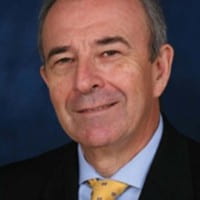 Erol Gelenbe was born in Turkey and is a graduate of the Middle East Technical University, Ankara, and Brooklyn Poly. In the 1970’s he suggested a Markov chain model of random access channels, showing in his JACM’1977 paper, while he was serving at the University of Liege (Belgium) and IRIA (France), that the random access channel is intrinsically unstable and that a simple state dependent control policy can stabilize the channel’s state and maximize its throughput. Subsequent work, published also with his students in IEEE COMPSAC’1978, showed that by just “listening to silence” it is possible to adaptively attain the random access channel’s optimal thruput. Since then, Erol has graduated over 90 PhD students, including 24 women, and is listed by the American Mathematical Society as the 9th most prolific PhD supervisor worldwide in the Mathematical Sciences. He has invented the eponymous “G-Networks” that provide efficient solutions to complex networks of inter-dependent and tightly coupled nodes, and pioneered Machine Learning based network routing algorithms. He is a Fellow of IEEE, ACM, IET, FRSS, the Royal Academy of Sciences of Belgium, the Science Academies of Hungary, Poland and Turkey, of the French National Academy of Technologies, and of Academia Europaea. In 2019 he was elected to the First Class of 18 IFIP Fellows. That year he was awarded Commander of Merit of France by President Macron, and in 2015 he was awarded France’s Legion of Honour for services to higher education and research by President Francois Hollande. A recipient of ACM’s SIGMETRICS Award and several French, British and Turkish technical awards, he received Honorary Degrees from three universities (in Belgium, Italy, Turkey), and the Honours of Commander of Merit of Italy and Grand Officer of the Order of the Star of Italy.
Erol Gelenbe was born in Turkey and is a graduate of the Middle East Technical University, Ankara, and Brooklyn Poly. In the 1970’s he suggested a Markov chain model of random access channels, showing in his JACM’1977 paper, while he was serving at the University of Liege (Belgium) and IRIA (France), that the random access channel is intrinsically unstable and that a simple state dependent control policy can stabilize the channel’s state and maximize its throughput. Subsequent work, published also with his students in IEEE COMPSAC’1978, showed that by just “listening to silence” it is possible to adaptively attain the random access channel’s optimal thruput. Since then, Erol has graduated over 90 PhD students, including 24 women, and is listed by the American Mathematical Society as the 9th most prolific PhD supervisor worldwide in the Mathematical Sciences. He has invented the eponymous “G-Networks” that provide efficient solutions to complex networks of inter-dependent and tightly coupled nodes, and pioneered Machine Learning based network routing algorithms. He is a Fellow of IEEE, ACM, IET, FRSS, the Royal Academy of Sciences of Belgium, the Science Academies of Hungary, Poland and Turkey, of the French National Academy of Technologies, and of Academia Europaea. In 2019 he was elected to the First Class of 18 IFIP Fellows. That year he was awarded Commander of Merit of France by President Macron, and in 2015 he was awarded France’s Legion of Honour for services to higher education and research by President Francois Hollande. A recipient of ACM’s SIGMETRICS Award and several French, British and Turkish technical awards, he received Honorary Degrees from three universities (in Belgium, Italy, Turkey), and the Honours of Commander of Merit of Italy and Grand Officer of the Order of the Star of Italy.
Monisha Ghosh, National Science Foundation
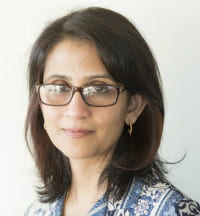 Dr. Monisha Ghosh is serving as the Chief Technology Officer (CTO) of the Federal Communications Commission (FCC) since Jan. 13, 2020. Prior to this, she was at NSF as a rotating Program Director since September 2017, in the Computer and Network System (CNS) division within the Directorate of Computer & Information Science and Engineering (CISE) where she managed wireless networking research within the Networking Technologies and Systems (NeTS) program. Dr. Ghosh is also a Research Professor at the University of Chicago, with a joint appointment at the Argonne National Laboratories, where she conducts research on wireless technologies for the IoT, 5G cellular, next generation Wi-Fi systems and spectrum coexistence. Prior to joining the University of Chicago in September 2015, she worked at Interdigital, Philips Research and Bell Laboratories, on various wireless systems such as the HDTV broadcast standard, cable standardization and on cognitive radio for the TV White Spaces. She has been an active contributor to many industry standards and was recognized with a Certificate of Appreciation for her outstanding contributions to IEEE 802.22. She is a Fellow of the IEEE.
Dr. Monisha Ghosh is serving as the Chief Technology Officer (CTO) of the Federal Communications Commission (FCC) since Jan. 13, 2020. Prior to this, she was at NSF as a rotating Program Director since September 2017, in the Computer and Network System (CNS) division within the Directorate of Computer & Information Science and Engineering (CISE) where she managed wireless networking research within the Networking Technologies and Systems (NeTS) program. Dr. Ghosh is also a Research Professor at the University of Chicago, with a joint appointment at the Argonne National Laboratories, where she conducts research on wireless technologies for the IoT, 5G cellular, next generation Wi-Fi systems and spectrum coexistence. Prior to joining the University of Chicago in September 2015, she worked at Interdigital, Philips Research and Bell Laboratories, on various wireless systems such as the HDTV broadcast standard, cable standardization and on cognitive radio for the TV White Spaces. She has been an active contributor to many industry standards and was recognized with a Certificate of Appreciation for her outstanding contributions to IEEE 802.22. She is a Fellow of the IEEE.
She received her Ph.D. in Electrical Engineering from the University of Southern California in 1991, and her B. Tech from the Indian Institute of Technology, Kharagpur (India) in 1986.
Lt Col Dan “Animal” Javorsek, DARPA
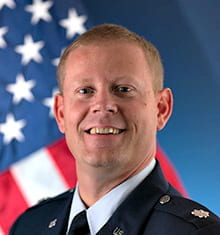 Lt. Col. Dan “Animal” Javorsek joined the Strategic Technology Office as a program manager in August 2018. Prior to his arrival, he was a flight test squadron commander and experimental test pilot in several different stealth and combat fighter aircraft. Javorsek earned a bachelor’s degree in aeronautical engineering from Purdue University, a master’s degree in flight test engineering from the Air University, a master’s degree in science & technology intelligence from the National Intelligence University, a master’s degree in airpower strategy & technology integration from Air University, as well as a doctorate in nuclear astrophysics from Purdue University.
Lt. Col. Dan “Animal” Javorsek joined the Strategic Technology Office as a program manager in August 2018. Prior to his arrival, he was a flight test squadron commander and experimental test pilot in several different stealth and combat fighter aircraft. Javorsek earned a bachelor’s degree in aeronautical engineering from Purdue University, a master’s degree in flight test engineering from the Air University, a master’s degree in science & technology intelligence from the National Intelligence University, a master’s degree in airpower strategy & technology integration from Air University, as well as a doctorate in nuclear astrophysics from Purdue University.
Bob Kahn, CNRI
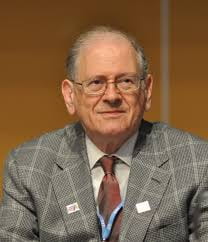 Robert E. Kahn is Chairman, CEO and President of the Corporation for National Research Initiatives (CNRI), which he founded in 1986 after a thirteen year term at the U.S. Defense Advanced Research Projects Agency (DARPA). CNRI was created as a not-for-profit organization to provide leadership and funding for research and development of the National Information Infrastructure.
Robert E. Kahn is Chairman, CEO and President of the Corporation for National Research Initiatives (CNRI), which he founded in 1986 after a thirteen year term at the U.S. Defense Advanced Research Projects Agency (DARPA). CNRI was created as a not-for-profit organization to provide leadership and funding for research and development of the National Information Infrastructure.
After receiving a B.E.E. from the City College of New York in 1960, Dr. Kahn earned M.A. and Ph.D. degrees from Princeton University in 1962 and 1964 respectively. He worked on the Technical Staff at Bell Laboratories and then became an Assistant Professor of Electrical Engineering at MIT. He took a leave of absence from MIT to join Bolt Beranek and Newman, where he was responsible for the system design of the Arpanet, the first packet-switched network. In 1972 he moved to DARPA and subsequently became Director of DARPA’s Information Processing Techniques Office (IPTO). While Director of IPTO he initiated the United States government’s billion dollar Strategic Computing Program, the largest computer research and development program ever undertaken by the federal government. Dr. Kahn conceived the idea of open-architecture networking. He is a co-inventor of the TCP/IP protocols and was responsible for originating DARPA’s Internet Program. Dr. Kahn also coined the term National Information Infrastructure (NII) in the mid 1980s which later became more widely known as the Information Super Highway.
In his recent work, Dr. Kahn has been developing the concept of a digital object architecture as a key component of the NII. This notion is providing a framework for interoperability of heterogeneous information systems and is being used in many applications such as the Digital Object Identifier (DOI). He is a co-inventor of Knowbot programs, mobile software agents in the network environment.
Dr. Kahn is a member of the National Academy of Engineering and the National Academy of Sciences, a Fellow of the IEEE, a Fellow of AAAI, a Fellow of ACM and a Fellow of the Computer History Museum. He is a member of the State Department’s Advisory Committee on International Communications and Information Policy and is Chair of the non-profit DONA Foundation based in Geneva.
He is a recipient of the AFIPS Harry Goode Memorial Award, the Marconi Award, the ACM SIGCOMM Award, the President’s Award from ACM, the IEEE Koji Kobayashi Computer and Communications Award, the IEEE Alexander Graham Bell Medal, the IEEE Third Millennium Medal, the ACM Software Systems Award, the Computerworld/Smithsonian Award, the ASIS Special Award and the Public Service Award from the Computing Research Board. He has twice received the Secretary of Defense Civilian Service Award. He is a recipient of the 1997 National Medal of Technology, the 2001 Charles Stark Draper Prize from the National Academy of Engineering, the 2002 Prince of Asturias Award, and the 2004 A. M. Turing Award from the Association for Computing Machinery. Dr. Kahn received the 2003 Digital ID World award for the Digital Object Architecture as a significant contribution (technology, policy or social) to the digital identity industry. In 2005, he was awarded the Townsend Harris Medal from the Alumni Association of the City College of New York, the 2004 Presidential Medal of Freedom, and the C & C Prize in Tokyo, Japan in 2005. He was inducted into the National Inventors Hall of Fame in May 2006, and awarded the Japan Prize for his work in “Information Communication Theory and Technology” in 2008. He received the Harold Pender Award from the University of Pennsylvania in 2010, the Queen Elizabeth Prize for Engineering in 2013 and the Benjamin Franklin Medal in 2018.
Dr. Kahn has received honorary degrees from Princeton University, University of Pavia, ETH Zurich, University of Maryland, George Mason University, the University of Central Florida, The City College of New York, and the University of Pisa, and an honorary fellowship from University College, London.
Frank Kuo
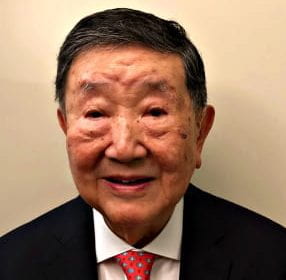 Frank Kuo received the B.S., M.S., and Ph.D. degrees in electrical engineering from the University of Illinois in Urbana Champaign. He is an IEEE Fellow.
Frank Kuo received the B.S., M.S., and Ph.D. degrees in electrical engineering from the University of Illinois in Urbana Champaign. He is an IEEE Fellow.
In his Ph D thesis he used the early Illiac – 1 computer. After his degrees in 1958, he joined the Research Division of Bell Laboratories in Murray Hill, NJ. There he worked in computer-aided design, and published two books for J. Wiley & Sons – Network Analysis and Synthesis, and System Analysis by Digital Computer.
Frank joined the University of Hawaii as a Professor of Electrical Engineering in 1966. There, with Norm Abramson and Wes Peterson, he helped develop the ALOHANET, the first radio packet switching computer networks. In 1973 Norm and Frank published one of the first computer networking books – Computer Communications Networks, Prentice-Hall.
In 1975-76, Frank joined the Office of the Secretary of Defense in the Pentagon as the Director of Information Systems. His responsibilities were program oversight in computer communications applications in command, control and intelligence. He often worked with Bob Kahn, who was at DARPA at that time.
In 1982, Frank joined SRI International in Menlo Park, CA as a Senior Scientific Advisor. In 1983, he led a research project which conceived the earlier design of the US National Science Foundation Network or NSFNET. Frank also served as Director of SRI’s Network Information Center, which was the central information resource of the Internet at the time.
Frank co-founded two start-up companies. One of them was GWcom, which was very successful in China. Frank received the Alexander von Humboldt Foundation Award in 1994. He spent the next year at the University of Mannheim where he co-edited the book Multimedia Communications: Protocols and Applications, Prentice-Hall. In his retirement, Frank spent ten years as a Mentor in the Stanford Graduate Business School’s Entrepreneurship Program.
Brennon Morioka, Dean, College of Engineering, Univ. of Hawaii at Manoa
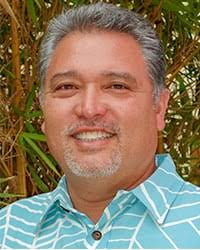 Dr. Brennon Morioka is currently the Dean of the College of Engineering at the University of Hawai‘i at Mānoa. The College educates and prepares 1,400 students to face the real world challenges in the areas of mechanical, electrical, civil, construction, computer, aerospace, and biomedical engineering. Students of the College have worked with approximately 60 faculty to do innovative research in all of these engineering fields.
Dr. Brennon Morioka is currently the Dean of the College of Engineering at the University of Hawai‘i at Mānoa. The College educates and prepares 1,400 students to face the real world challenges in the areas of mechanical, electrical, civil, construction, computer, aerospace, and biomedical engineering. Students of the College have worked with approximately 60 faculty to do innovative research in all of these engineering fields.
Dr. Morioka is a licensed civil engineer in Hawai‘i and California. He has served in multiple executive positions in Hawai‘i. He was the General Manager for Electrification of Transportation at Hawaiian Electric Company, the former Director for the State of Hawai‘i Department of Transportation, and the Deputy Executive Director for the Honolulu Authority for Rapid Transportation (HART). He also served as Vice President and Area Manager for CH2M HILL and as Executive Vice President of Shioi Construction. All of these have provided an expansive experience in both the public and private sectors in the engineering and business community.
Dr. Morioka received his Bachelor’s and Master’s of Science degrees in Civil Engineering from the University of California at Berkeley, and completed his PhD here at the University of Hawai‘i at Mānoa.
He serves on the numerous boards of community and non-profit organizations, including the Aloha Stadium Authority, the US Japan Council, Ahahui Koa Anuenue, Friends of Iolani Palace, Mothers Against Drunk Driving, and PICHTR, the Pacific International Center for High Technology Research.
Don Nielson, SRI International
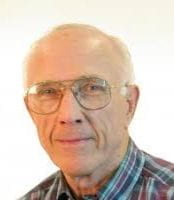 Don Nielson joined SRI in 1959 as a research engineer, taking on assignments in telecommunications technology while working on his Ph.D. at Stanford, which he received in 1969. He was named assistant director of the Telecom Department in 1973, and in 1978 became director of the Telecommunications Science Center. In 1984, Nielson was named vice president of the newly formed Computer Science and Technology Division.
Don Nielson joined SRI in 1959 as a research engineer, taking on assignments in telecommunications technology while working on his Ph.D. at Stanford, which he received in 1969. He was named assistant director of the Telecom Department in 1973, and in 1978 became director of the Telecommunications Science Center. In 1984, Nielson was named vice president of the newly formed Computer Science and Technology Division.
One of the most important of SRI’s projects in high-speed networking was the Packet Radio project. It began in 1973 and was sponsored by DARPA to provide reliable data communications in a difficult mobile environment. The packet radio network (PRNET) was the first mobile digital radio network and was able to self-organize and then maintain its network capacity through dynamic management of its nodal resources. Nielson—along with Ron Kunzelman and Stan Fralick—led this important program. They built the first ARPA packet-switched demonstration radio network in the San Francisco Bay Area. It included a controlling node called a station and individual radio nodes each of which could be mobile, serve as a repeater, and offer network access to an attached terminal or host. One such node was a mobile van capable of giving interested parties the experience of mobile digital radio. Its packet-based technology was designed to work with existing and emerging packet networks that by 1976-7 became the first major instance of internetworking.
Nielson supported the development of the first hand-held computer terminal. This device, made principally for the deaf community by 1978, was also built as a very small lightweight portable telecom terminal.
When Nielson began his career at SRI, the heart of telecommunications technology was focused on analog hardware, mainly antennas, radio design, and telecom components. He steered SRI’s telecom work to the more modern and sophisticated digitally based computer networks, where software development was the key. SRI’s preeminence in telecom technology throughout this transition was due largely to Nielson’s contributions—his technical knowledge, his management capabilities, and his foresight.
While an SRI vice president and director of the Computing and Engineering Sciences Division (1983-1998), Dr. Nielson played a critical role in launching two of SRI’s most successful spin-off companies: Nuance Corporation, a leader in automatic speech recognition, and Intuitive Surgical, Inc., which now leads the world in revolutionary minimally invasive surgical systems.
He is a Life Fellow of the Institute of Electrical and Electronics Engineers (2000) and has won a Distinguished Service Medal from the U.S. Air Force (1998), the SRI’s Mimi Award for fostering the professional growth of co-workers (1996), and is a member of the SRI Alumni Hall of Fame (2000).
He has served on technical advisory committees for DARPA (1985-6), the Advisory Board for the Director, Defense Information Systems Agency (1988-1993), and has been a member of the U.S. Air Force Scientific Advisory Board (1993-1998) and the National Research Council studies on Air and Space Transportation and Network-Centric Naval Forces (1997-2000). He has been on the Board of Directors for Corona (now Nuance) Corporation (1994-1995) and the Australian Artificial Intelligence Institute (1988-1995).
Katia Obraczka, University of California, Santa Cruz
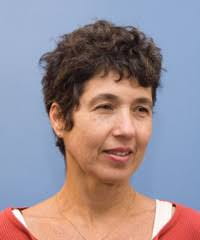 Katia Obraczka is a Professor of Computer Engineering and Graduate Director at Department of Computer Engineering, University of California, Santa Cruz.
Katia Obraczka is a Professor of Computer Engineering and Graduate Director at Department of Computer Engineering, University of California, Santa Cruz.
Obraczka obtained her M.S. and Ph.D. in computer science from University of Southern California in 1984 and 1990 respectively and also received an M.S. in computer engineering in 1987 from the Federal University of Rio de Janeiro in Rio de Janeiro, Brazil. After graduation, she remained at USC, working as a research scientist at the Information Sciences Institute.
She was named Fellow of the Institute of Electrical and Electronics Engineers (IEEE) in 2014 “for contributions to energy-efficient protocols and routing in wireless networks.”
Kathyayani Srikanteswara, Intel
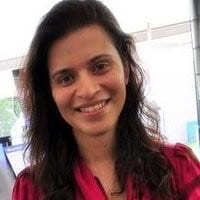 Srikathyayani Srikanteswara (Kathyayani) is a Sr. Research Scientist at Intel Labs leading research in Information Centric Networks (ICN) for Edge Computing. Her research focuses on applications where ICN can add value to industry. Also an expert in spectrum sharing, she helped develop Intel’s policy on shared spectrum and lead standardization efforts in US and Europe. She has developed key technologies for TV White Spaces, spectrum sensing, cognitive radios and interference mitigation for WiFi and multi-radio systems. Prior to joining Intel, she was with Navsys Corporation, working on advanced GPS receiver techniques using SDR, and was a research faculty member at Virginia Tech. She received her BS with Honors in Electrical Engineering from IIT Varanasi, India, and her MS and Ph.D. from Virginia Tech.
Srikathyayani Srikanteswara (Kathyayani) is a Sr. Research Scientist at Intel Labs leading research in Information Centric Networks (ICN) for Edge Computing. Her research focuses on applications where ICN can add value to industry. Also an expert in spectrum sharing, she helped develop Intel’s policy on shared spectrum and lead standardization efforts in US and Europe. She has developed key technologies for TV White Spaces, spectrum sensing, cognitive radios and interference mitigation for WiFi and multi-radio systems. Prior to joining Intel, she was with Navsys Corporation, working on advanced GPS receiver techniques using SDR, and was a research faculty member at Virginia Tech. She received her BS with Honors in Electrical Engineering from IIT Varanasi, India, and her MS and Ph.D. from Virginia Tech.
Bishal Thapa, Raytheon BBN Technologies
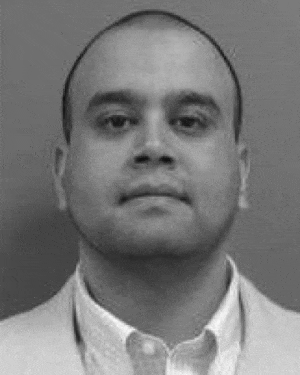 Dr. Bishal Thapa has been a senior Research Scientist at Raytheon Technologies since joining the Network and Cyber Technologies group in 2011. He received his Ph.D. from Northeastern University focused on wireless security work with an emphasis on jamming and anti-jamming of wireless communication. He is a proven leader in the field of cognitive radio systems and tactical communications networks. In his capacity as the PI for various DoD projects, he has led the tactical comms and networks effort for Raytheon across DARPA, IARPA, DHS, NSC, ARL, AFRL and ONR project. Most recent work includes the inception of the concept of heterogeneous network of networks technology at DARPA Riser 2015 conference, architecture build-up, and implementation across all-domain (maritime, ground, aerial and space) under DARPA RFMap, C2E, DyNAMO, TUNA, CDMaST, Blackjack, Timely, AFRL ROSET, ONR 5G, and NSC open 5G slice projects. He has published in numerous journals and high impact conference papers. He was a winner of the ACM WiSec Best Paper Award, DARPA Spectrum Challenge, and Top 50 DARPA Risers award selected nationally in 2015. Internally, Bishal has won cross-company Raytheon Business Development Incentive award, Ray Tomlinson (inventor of ‘@’ in the email) award, and IDS Innovation Challenge award. He was most recently selected as one of the 350 Transformational Leaders across SAS in 2019.
Dr. Bishal Thapa has been a senior Research Scientist at Raytheon Technologies since joining the Network and Cyber Technologies group in 2011. He received his Ph.D. from Northeastern University focused on wireless security work with an emphasis on jamming and anti-jamming of wireless communication. He is a proven leader in the field of cognitive radio systems and tactical communications networks. In his capacity as the PI for various DoD projects, he has led the tactical comms and networks effort for Raytheon across DARPA, IARPA, DHS, NSC, ARL, AFRL and ONR project. Most recent work includes the inception of the concept of heterogeneous network of networks technology at DARPA Riser 2015 conference, architecture build-up, and implementation across all-domain (maritime, ground, aerial and space) under DARPA RFMap, C2E, DyNAMO, TUNA, CDMaST, Blackjack, Timely, AFRL ROSET, ONR 5G, and NSC open 5G slice projects. He has published in numerous journals and high impact conference papers. He was a winner of the ACM WiSec Best Paper Award, DARPA Spectrum Challenge, and Top 50 DARPA Risers award selected nationally in 2015. Internally, Bishal has won cross-company Raytheon Business Development Incentive award, Ray Tomlinson (inventor of ‘@’ in the email) award, and IDS Innovation Challenge award. He was most recently selected as one of the 350 Transformational Leaders across SAS in 2019.
Fouad Tobagi, Stanford University
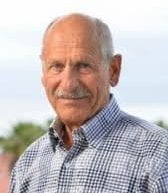 Dr. Fouad Tobagi received his PhD from UCLA in 1974. He is currently a professor in the Electrical Engineering Department of Stanford University. Tobagi works on network control mechanisms for handling multimedia traffic (voice, video and TCP- based applications) and on the performance assessment of networked multimedia applications using user-perceived quality measures. He also investigates the design of wireless networks, including QoS-based media access control and network resource management, as well as network architectures and infrastructures for the support of mobile users, all meeting the requirements of multimedia traffic. He also investigates the design of metropolitan and wide area networks combining optical and electronic networking technologies, including topological design, capacity provisioning, and adaptive routing.
Dr. Fouad Tobagi received his PhD from UCLA in 1974. He is currently a professor in the Electrical Engineering Department of Stanford University. Tobagi works on network control mechanisms for handling multimedia traffic (voice, video and TCP- based applications) and on the performance assessment of networked multimedia applications using user-perceived quality measures. He also investigates the design of wireless networks, including QoS-based media access control and network resource management, as well as network architectures and infrastructures for the support of mobile users, all meeting the requirements of multimedia traffic. He also investigates the design of metropolitan and wide area networks combining optical and electronic networking technologies, including topological design, capacity provisioning, and adaptive routing.
Marc Weber, Computer History Museum
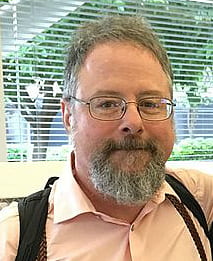 Marc Weber currently serves as Curatorial Director of the Internet History Program at the Computer History Museum (CHM) in Mountain View, CA. He started the CHM’s Internet History Program as Founding Curator and developed the Web, Networking, and Mobile galleries of the Museum’s permanent exhibit “Revolution: The First 2000 Years of Computing”.
Marc Weber currently serves as Curatorial Director of the Internet History Program at the Computer History Museum (CHM) in Mountain View, CA. He started the CHM’s Internet History Program as Founding Curator and developed the Web, Networking, and Mobile galleries of the Museum’s permanent exhibit “Revolution: The First 2000 Years of Computing”.
Marc pioneered Web history as a topic starting in early 1995. His initial investigations as a journalist became the Web History Project, which assembled the first archive of early Web materials and interviewed over 80 key figures with crucial help from the Web’s main inventor Sir Tim Berners Lee and colleagues.
In 2006, prior to his work with the Museum, he co-founded the Web History Center whose 12 members include Stanford, the Internet Archive, SRI, and SLAC.
Marc is an award-winning technology writer and journalist. He has consulted on technology topics since 1987 and has been author or editor of four how-to guides for computer consultants. He holds bachelors degrees in Neurobiology and in Creative Writing (with Honors) from Brown University in Providence, Rhode Island.
Alexander Wolf, Dean, Baskin School of Engineering, UCSC
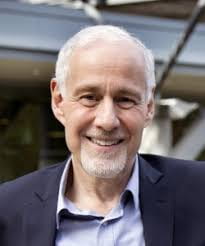 Alexander L. Wolf serves as Dean of the Baskin School of Engineering and is a Distinguished Professor in the department of Computer Science and Engineering at the University of California, Santa Cruz (US).
Alexander L. Wolf serves as Dean of the Baskin School of Engineering and is a Distinguished Professor in the department of Computer Science and Engineering at the University of California, Santa Cruz (US).
Prof. Wolf received the B.A. degree from Queens College of the City University of New York, majoring in both Geology and Computer Science. He received the M.S. and Ph.D. degrees from the Department of Computer Science at the University of Massachusetts at Amherst. Prof. Wolf was a Member of the Technical Staff at AT&T Bell Laboratories (now AT&T Labs Research and Bell Laboratories) in Murray Hill, New Jersey, before joining the University of Colorado faculty. During his years at the University of Colorado, Prof. Wolf held the ranks of assistant, associate, and full professor. He also held the Charles Victor Schelke Chair in the College of Engineering. At the University of Lugano he helped found the Faculty of Informatics, the first computer science faculty in the Italian-speaking region of Switzerland. Before moving to his present position, Prof. Wolf held a chaired professorship in the Department of Computing at Imperial College London.
Prof. Wolf’s research interests span the areas of distributed systems, networking, and software engineering. His achievements include seminal work in software architecture, business analytics, and information-centric networks. His more recent projects concern cloud computing, data-center networking, and service-based systems hosted on MANETs.
Prof. Wolf served as President of the Association for Computing Machinery (ACM) and chaired the Executive Committee (EC) of the ACM Council, the governing authority of the association. He was also a founding member of the ACM Europe Council and was a long-time participant in the ACM Distinguished Speakers Program (DSP). He previously served as Secretary-Treasurer and then Vice President of the ACM, Chair of the ACM Special Interest Group (SIG) Governing Board (SGB), Vice Chair and then Chair of the ACM Special Interest Group in Software Engineering (SIGSOFT), and Chair of the ACM Software System Award committee. He served on the editorial boards of the Research Highlights section of ACM’s flagship publication Communications of the ACM (CACM), the ACM journal Transactions on Software Engineering and Methodology (TOSEM), the IEEE Computer Society journal Transactions on Software Engineering (TSE), and the Wiley journal Software Process – Improvement and Practice (SPIP), and has chaired a number of international program committees.
Prof. Wolf is a Fellow of the ACM, a Fellow of the IEEE, a Chartered Fellow of the British Computer Society (BCS), holder of a Royal Society-Wolfson Research Merit Award, two-time recipient of an ACM SIGSOFT Research Impact Award ([1],[2]), recipient of both the ACM SIGSOFT Outstanding Research Award and Distinguished Service Award, and recipient of an Alumni Award for Outstanding Achievement in Research from the Department of Computer Science at the University of Massachusetts at Amherst.
